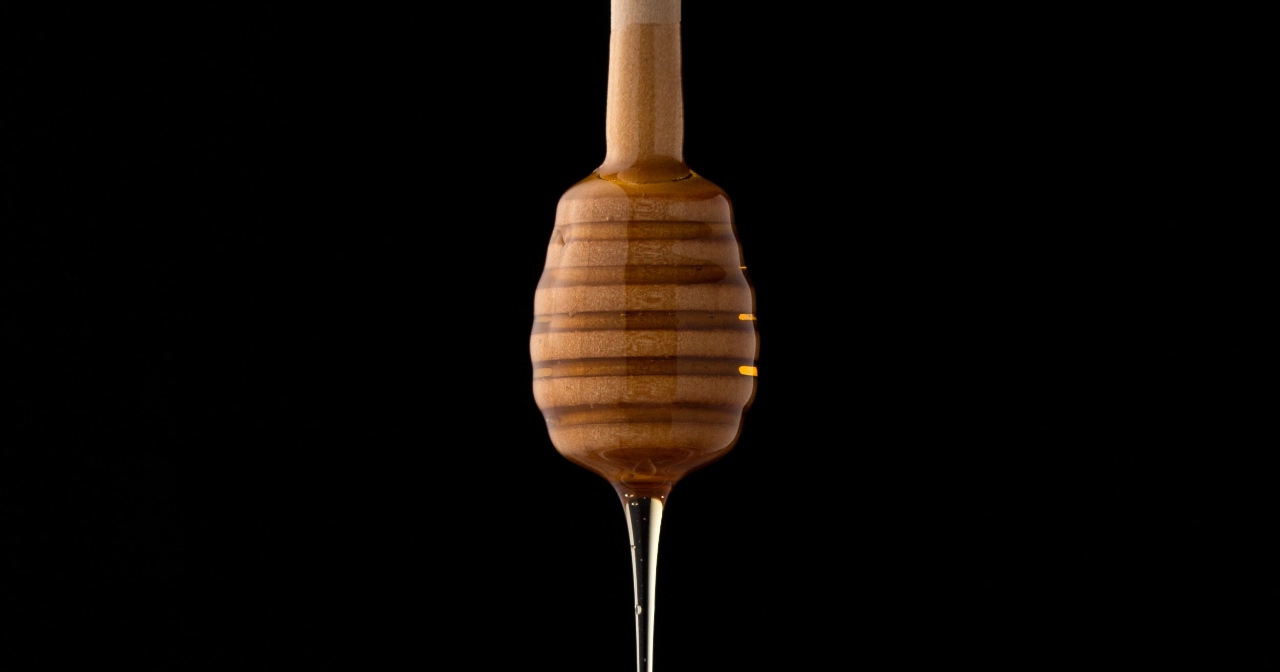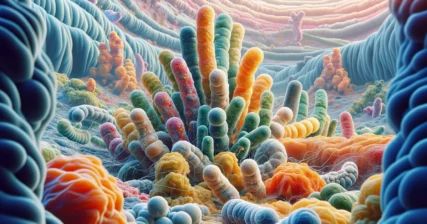Listen on: Apple Podcasts | Spotify
Though many men worry about producing too little testosterone, many deal with elevated estrogen. In either case, the physical and mental health effects can be the same. Natural compounds like chrysin may be part of a solution, as chrysin may act as an aromatase inhibitor, reducing the conversion of testosterone to estrogen.
Research shows it offers numerous other health benefits as well.

Feel Better Fast. Guaranteed.
Energy+, EDGE, and MentaBiotics make up the Happy Juice supplement stack, with ingredients clinically proven to:
- decrease anxiousness scores by 55%
- decrease irritability scores by 60%
- decrease fatigue by 64%
- decrease anger 54%
- decrease tension by 45%
- decrease confusion by 43%
- decrease overall distress by 49%
- increase good bacteria by 70%
- decrease negative mood by 105%
- increase positive mood by 211%
What is chrysin?
Chrysin is a naturally occurring polyphenol. You can extract it from:
- honey
- propolis
- bitter melon
- wild Himalayan pear
- passionflower
- silver linden
- some types of geranium
To date, research has focused on chrysin ingestion alone. Whether it would provide any topical benefit remains to be seen.
Chrysin Health Benefits
Though most people learn of chrysin as an aromatase inhibitor, it affects many other aspects of health as well.
Aromatase inhibition
Excess estrogen in men or women contributes to physique, performance, and health problems.
Like low testosterone levels, in men, excess estrogen contributes to gynecomastia (a.k.a. moobs) and other female physical characteristics. It may also increase body fat storage in the arms and hips and compromise muscle growth.
Excess estrogen contributes to breast cancer, endometriosis, and difficulty improving body composition, strength, and physical performance in women.
Chrysin may reduce the conversion of testosterone to estrogen. Indole-3-carbinol (I3C) and diindolylmethane (DIM) are two other popular natural products that may reduce aromatization. While they seem to be effective in some people, they don’t seem to do much for me. That prompted me to investigate chrysin.
Periodically, I develop mild gynecomastia on the left side of my chest. It seems to coincide with increased sun exposure, which increases vitamin D and may drive up testosterone production, which may increase testosterone aromatization to estrogen.
In some men, as total testosterone levels rise, some of that extra testosterone gets converted to estrogen and can lead to undesirable effects. For me, my left nipple gets sore and firm. In the winter, it seems to go away.
Animal studies and in vitro research shows chrysin does act as an aromatase inhibitor. However, there’s very little in vivo research at this point.
That said, it is very safe, so I ordered some to experiment on my own.
Unfortunately, some supplement companies include it in “testosterone-boosting supplements.” That’s pretty misleading. Chrysin does not increase testosterone but may keep estrogen levels in check or even lower them. In some men, lower estrogen leads to the same physical and mental health benefits as raising testosterone.
Read also: Irritable Male Syndrome, Andropause, and Reclaiming Your Manhood.
Healthy inflammation levels
Like other natural compounds, such as curcumin, quercetin, and omega-3 fatty acids, chrysin supports healthy inflammation levels.
Chrysin alleviates inflammation through inhibition of COX-2, prostaglandin-E2, histamine, NF-γB pathway, tumor necrosis factor- (TNF-) alpha, iNOS, and cytokines (interleukin-1β, interleukin-2, interleukin-6, and interleukin-12) and activation of peroxisome proliferator-activated factor γ (PPARγ).
Joohee Jung, Emerging Utilization of Chrysin Using Nanoscale Modification
Inflammation contributes to heart disease, cancer, allergies, cognitive dysfunction, and many other conditions.
Of course, a big part of staying healthy is eating well, following a good exercise program, and getting sufficient sleep. Chrysin may support better inflammation levels, but you still need to control your diet and lifestyle.
Cardiovascular health
Chrysin may support heart health by slowing the progression of atherosclerosis.
Inflammation contributes to plaque formation, and since chrysin supports healthier inflammation levels, it may slow plaque formation. In addition, like nattokinase, chrysin may reduce cholesterol oxidation.
Research shows it may also help you maintain healthier triglyceride and cholesterol levels.
Research also shows it may enhance nitric oxide production, which supports blood vessel function.
Normal blood sugar
Animal research shows chrysin may help regulate blood sugar levels by improving the function of pancreatic cells as well as improving glucose uptake into cells. It also acts as an antioxidant and enhances glutathione production, which may help reduce tissue damage in people with type II diabetes or metabolic syndrome.
Aging and skin health
Because of its antioxidant effects, chrysin may slow the progression of aging tissues, including the skin.
It may also reduce skin damage caused by excessive sun exposure or skin conditions like psoriasis.
Interestingly, some research shows that the use of chrysin in combination with cancer therapies reduces oxidation-related side effects of cancer treatment.
Additional Effects
Chrysin acts on GABA receptors, which may reduce feelings of anxiety.
It also supports liver health and may reduce the effects of conditions such as fatty liver disease.
There’s even some evidence it could reduce balding hair.
Chrysin Bioavailability
Like other natural compounds, such as curcumin, chrysin absorption presents a problem.
Taken alone, much of it gets broken down in the digestive tract before it can be absorbed and used. This means people need to take large doses to have a small effect.
Being that the compound is relatively new on the research front, I suspect companies will come up with more bioavailable forms in the near future, such as phytosomes or chrysin-bioperine combinations.
As bioavailability improves, so will the impact chrysin has on one’s health.
Summary
After decades of natural product research, writing, experience, and experimentation, I understand one important fact: Not all natural products affect all people in the same way.
Even a supplement like creatine monohydrate, one of the most researched and effective ergogenic aids has no effect on about 30% of creatine users.
Animal research and anecdotal evidence suggest chrysin could have multiple positive effects on one’s health, with amortization inhibition being one of them. However, I try to always stress the fact that what works for one does not work for all.

Feel Better Fast. Guaranteed.
Energy+, EDGE, and MentaBiotics make up the Happy Juice supplement stack, with ingredients clinically proven to:
- decrease anxiousness scores by 55%
- decrease irritability scores by 60%
- decrease fatigue by 64%
- decrease anger 54%
- decrease tension by 45%
- decrease confusion by 43%
- decrease overall distress by 49%
- increase good bacteria by 70%
- decrease negative mood by 105%
- increase positive mood by 211%
References
Antioxidant and Prooxidant Effects of Phenolics on Pancreatic β-Cells in Vitro | Journal of Agricultural and Food Chemistry. https://pubs.acs.org/doi/10.1021/jf020615a. Accessed 30 June 2021.
Balam et al. – 2020 – Inhibitory Effect of Chrysin on Estrogen Biosynthe.Pdf. https://www.cell.com/heliyon/pdf/S2405-8440(20)30402-3.pdf. Accessed 30 June 2021.
Balam, Farinaz Hosseini, et al. “Inhibitory Effect of Chrysin on Estrogen Biosynthesis by Suppression of Enzyme Aromatase (CYP19): A Systematic Review.” Heliyon, vol. 6, no. 3, Mar. 2020, p. e03557. DOI.org (Crossref), doi:10.1016/j.heliyon.2020.e03557.
Chrysin – an Overview | ScienceDirect Topics. https://www.sciencedirect.com/topics/medicine-and-dentistry/chrysin. Accessed 30 June 2021.
Chrysin and Luteolin Attenuate Diabetes‐Induced Impairment in Endothelial‐Dependent Relaxation: Effect on Lipid Profile, AGEs and NO Generation – El‐Bassossy – 2013 – Phytotherapy Research – Wiley Online Library. https://onlinelibrary.wiley.com/doi/abs/10.1002/ptr.4917. Accessed 30 June 2021.
“Chrysin: Health Benefits, Side Effects, Uses, Dose & Precautions.” RxList, https://www.rxlist.com/chrysin/supplements.htm. Accessed 30 June 2021.
Dinda, B., et al. “Oroxylum Indicum (L.) Kurz, an Important Asian Traditional Medicine: From Traditional Uses to Scientific Data for Its Commercial Exploitation.” Journal of Ethnopharmacology, vol. 161, Feb. 2015, pp. 255–78. ScienceDirect, doi:10.1016/j.jep.2014.12.027.
Gambelunghe, Cristiana, et al. “Effects of Chrysin on Urinary Testosterone Levels in Human Males.” Journal of Medicinal Food, vol. 6, no. 4, 2003, pp. 387–90. PubMed, doi:10.1089/109662003772519967.
Rodríguez-Landa, Juan F., et al. “Chrysin Reduces Anxiety-like Behavior through Actions on GABA A Receptors during Metestrus-Diestrus in the Rat.” Behavioural Brain Research, vol. 397, Jan. 2021, p. 112952. ResearchGate, doi:10.1016/j.bbr.2020.112952.
Rodríguez-Landa, Juan Francisco, et al. “Chrysin (5,7-Dihydroxyflavone) Exerts Anxiolytic-like Effects through GABAA Receptors in a Surgical Menopause Model in Rats.” Biomedicine & Pharmacotherapy, vol. 109, Jan. 2019, pp. 2387–95. ScienceDirect, doi:10.1016/j.biopha.2018.11.111.
Rubinow, Katya B. “Chapter 24: Estrogens and Body Weight Regulation in Men.” Advances in Experimental Medicine and Biology, vol. 1043, 2017, pp. 285–313. PubMed Central, doi:10.1007/978-3-319-70178-3_14.
Torres-Piedra, Mariana, et al. “A Comparative Study of Flavonoid Analogues on Streptozotocin–Nicotinamide Induced Diabetic Rats: Quercetin as a Potential Antidiabetic Agent Acting via 11β-Hydroxysteroid Dehydrogenase Type 1 Inhibition.” European Journal of Medicinal Chemistry, vol. 45, no. 6, June 2010, pp. 2606–12. ScienceDirect, doi:10.1016/j.ejmech.2010.02.049.
Zou, Xiao-Qing, et al. “Furoxan Nitric Oxide Donor Coupled Chrysin Derivatives: Synthesis and Vasculoprotection.” Bioorganic & Medicinal Chemistry Letters, vol. 21, no. 4, Feb. 2011, pp. 1222–26. ScienceDirect, doi:10.1016/j.bmcl.2010.12.077.



